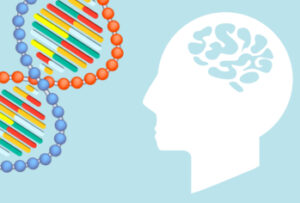 In 2022, Chris Hemsworth, best known for portraying Thor in the Marvel Cinematic Universe, released a show on Disney+ called Limitless. This show explored ways to combat aging and discover the full potential of the human body. However, in episode 5, the mighty Thor himself announced to the world that through genetic testing, he discovered that he had inherited two copies of the APOE ε4 risk alleles that increase the risk of developing Alzheimer’s disease. With this information, he decided to take a hiatus from acting. Hemsworth’s revelation has brought much attention to Alzheimer’s Disease and the APOE gene.
In 2022, Chris Hemsworth, best known for portraying Thor in the Marvel Cinematic Universe, released a show on Disney+ called Limitless. This show explored ways to combat aging and discover the full potential of the human body. However, in episode 5, the mighty Thor himself announced to the world that through genetic testing, he discovered that he had inherited two copies of the APOE ε4 risk alleles that increase the risk of developing Alzheimer’s disease. With this information, he decided to take a hiatus from acting. Hemsworth’s revelation has brought much attention to Alzheimer’s Disease and the APOE gene.
Alzheimer’s disease (AD) is a progressive type of dementia beginning with minor cognitive issues and progressing into severe and debilitating late-stage impairment. Most cases are late-onset, affecting people who are 65 or older. However, less commonly, AD can occur in younger individuals. The cause of Alzheimer’s disease is not fully understood. There are some changes to the brain – amyloid plaques and neurofibrillary tangles – that can be seen across most cases of Alzheimer’s disease that affect the function of neurons.
Alzheimer’s disease progresses across three stages…
- Early-stage Alzheimer’s: During this stage, the symptoms may be less obvious. People that are quite close to the patient, like a family member, may notice some changes such as difficulty with short-term memory (forgetting names and misplacing items); issues with planning and organizing; and difficulty completing tasks.
This kind of short-term memory loss can happen to anybody, so it is important to pay attention to the frequency and patterns of these symptoms.
- Middle-stage Alzheimer’s: In this stage, which lasts the longest, symptoms will be more obvious and may include increasing difficulties with short-term memory; mood changes, like anger, frustration, and sadness; some personal long-term memory changes such as where they are from, their phone number, or their address; confusion about the date or where they are; sleep changes; trouble with bowel and bladder control; and needing help with daily activities, like hygiene, dressing, and preparing meals.
- Late-stage Alzheimer’s: During this stage, patients require significant assistance with daily life and may exhibit significant changes in abilities like walking, sitting, and eating; communication issues and inability to speak many words or phrases; vulnerability to certain infections like pneumonia; forgetting recent experiences, severe confusion, and lack of awareness of their surroundings.
Alzheimer’s Disease can have a genetic component.
 Both early and late-onset Alzheimer’s can run in families, but most cases of AD are not familial. Approximately 25% of all Alzheimer’s disease cases are familial (3 or more relatives with AD), while 75% are non-familial.
Both early and late-onset Alzheimer’s can run in families, but most cases of AD are not familial. Approximately 25% of all Alzheimer’s disease cases are familial (3 or more relatives with AD), while 75% are non-familial.
Genes Causing Early-onset Alzheimer’s: We do know of three genes that are associated with early-onset Alzheimer’s: APP, PSEN1, and PSEN2. Changes in these genes (variants) are autosomal dominant, meaning that a patient only needs one copy of the variant in order to be affected. The APP and PSEN1 variants cause early-onset Alzheimer’s. However, the variant for PSEN2 is less penetrant, meaning not everyone who has a variant in this gene will go on to develop the condition, but their risk is still increased.
Genes Associated with Late-onset Alzheimer’s: There are also other genes that are known to influence an individual’s risk of developing Alzheimer’s. The most well-known of these genes is called APOE. Everybody has two copies of the APOE gene, and there are three different versions, or alleles: APOE ε2, ε3, or ε4. If a person inherits two ε4 alleles (one from each parent), this can increase the risk for Alzheimer’s.
- For people with no APOE ε4 alleles, the average lifetime risk for AD is 10%. That increases if a first-degree relative (parent or sibling) has AD.
- For those with a single APOE ε4 allele, the risk of AD is 2-3 times higher
- For those with two APOE ε4 alleles, the risk is 2-10 times higher.
However, it is important to know that APOE alleles cannot determine for sure whether or not someone will develop AD. They are simply a risk factor.
While there are no specific recommendations on how to prevent AD, studies do suggest that with an active lifestyle, staying mentally active, and maintaining good heart health, the risk may be lessened.
APOE testing is not currently part of recommended clinical care; however, many direct-to-consumer genetic testing companies do offer this testing as part of their results. If you have testing and an increased risk is identified, you should speak with your healthcare provider or a genetic counselor to better understand what that result means for you.

Guest blog author: Coltrane Beck-Chance, a genetic counseling summer intern at GGC from UNC Greensboro.
_______________________________________
References:
- Alzheimer’s Disease Genetics Fact Sheet. (n.d.). National Institute on Aging. Retrieved July 5, 2023, from https://www.nia.nih.gov/health/alzheimers-disease-genetics-fact-sheet
- Bird, T. D. (1993). Alzheimer Disease Overview. In M. P. Adam, G. M. Mirzaa, R. A. Pagon, S. E. Wallace, L. J. Bean, K. W. Gripp, & A. Amemiya (Eds.), GeneReviews®. University of Washington, Seattle. http://www.ncbi.nlm.nih.gov/books/NBK1161/
- Causes and Risk Factors for Alzheimer’s Disease. (n.d.). Alzheimer’s Disease and Dementia. Retrieved July 5, 2023, from https://alz.org/alzheimers-dementia/what-is-alzheimers/causes-and-risk-factors
- Goldman, J. S., Hahn, S. E., Catania, J. W., Larusse-Eckert, S., Butson, M. Barber., Rumbaugh, M., Strecker, M. N., Roberts, J. S., Burke, W., Mayeux, R., & Bird, T. (2011). Genetic counseling and testing for Alzheimer disease: Joint practice guidelines of the American College of Medical Genetics and the National Society of Genetic Counselors. Genetics in Medicine, 13(6), 597–605. https://doi.org/10.1097/GIM.0b013e31821d69b8
- Reitz, C., Tang, M.-X., Schupf, N., Manly, J. J., Mayeux, R., & Luchsinger, J. A. (2010). A Summary Risk Score for the Prediction of Alzheimer Disease in Elderly Persons. Archives of Neurology, 67(7), 835–841. https://doi.org/10.1001/archneurol.2010.136
- Stages of Alzheimer’s. (n.d.). Alzheimer’s Disease and Dementia. Retrieved July 4, 2023, from https://alz.org/alzheimers-dementia/stages
- What Happens to the Brain in Alzheimer’s Disease? (n.d.). National Institute on Aging. Retrieved July 5, 2023, from https://www.nia.nih.gov/health/what-happens-brain-alzheimers-disease
 In 2022, Chris Hemsworth, best known for portraying Thor in the Marvel Cinematic Universe, released a show on Disney+ called Limitless. This show explored ways to combat aging and discover the full potential of the human body. However, in episode 5, the mighty Thor himself announced to the world that through genetic testing, he discovered that he had inherited two copies of the APOE ε4 risk alleles that increase the risk of developing Alzheimer’s disease. With this information, he decided to take a hiatus from acting. Hemsworth’s revelation has brought much attention to Alzheimer’s Disease and the APOE gene.
In 2022, Chris Hemsworth, best known for portraying Thor in the Marvel Cinematic Universe, released a show on Disney+ called Limitless. This show explored ways to combat aging and discover the full potential of the human body. However, in episode 5, the mighty Thor himself announced to the world that through genetic testing, he discovered that he had inherited two copies of the APOE ε4 risk alleles that increase the risk of developing Alzheimer’s disease. With this information, he decided to take a hiatus from acting. Hemsworth’s revelation has brought much attention to Alzheimer’s Disease and the APOE gene. Both early and late-onset Alzheimer’s can run in families, but most cases of AD are not familial. Approximately 25% of all Alzheimer’s disease cases are familial (3 or more relatives with AD), while 75% are non-familial.
Both early and late-onset Alzheimer’s can run in families, but most cases of AD are not familial. Approximately 25% of all Alzheimer’s disease cases are familial (3 or more relatives with AD), while 75% are non-familial.
